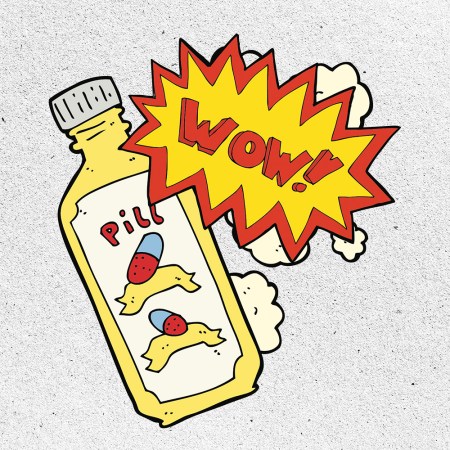In an appearance on The Tim Ferris Show, a tech CEO named Sam Corcos claimed that he has been “fully news sober” for nearly a decade. What does that mean? No news, no television, no articles, no social media.
“No current events in any form,” he told an astonished Ferris. “I read Ryan Holiday’s book, Trust Me, I’m Lying, which really frightened me about the state of the media…[It was] originally a one-month experiment…[I decided] I’m just going to try a one-to-one replacement of reading books during that time period. And I read eight books that month, which was more than I probably read in the previous five years.”
In the 10 years since, Corcos’s one-off experiment has morphed into a full-fledged lifestyle. He reads constantly (he’s closing in on 1,000 books, according to his Goodreads profile), and refuses to consume the news. If he needs to post on social media — or respond to someone — it’s handled through his executive assistants.
He compared the news industry to orange juice (“They’ve managed to convince people that watching the news is what responsible citizens do…[similar to how they convinced us] orange juice is healthy, because it has vitamin C, even though it’s really almost indistinguishable from a can of soda,”) and said he feels physically better without it in his life.
“I [feel] less anxious during the day,” he said. “And it was interesting when you have that separation for long enough, and I have friends who are panicked about something that they heard, and I would find myself asking, ‘But does that matter?’ And it’s like, wow, I would’ve been in the same frenzy if I was paying attention, and it really doesn’t matter. Almost none of these things are important.”
Unsurprisingly, as outtakes of this…hot take have made their rounds of the internet (the very arena that Corcos no longer visits), people have expressed some very strong opinions on it. We’ll try to approach the debate from a more sensible place. Is Corcos right? Could “news sobriety” change your life? Is it even possible to practice it? And if so — is it ethical?
Why “Memory Dividends” Are the Best Asset You’ll Ever Earn
Invest in experiences. You’ll be rich for the rest of your life.Shutting the Faucet
In the doomscroll era, it’s understandable that people are desperate for a news cycle reprieve. The tag “going monk mode” currently has billions of impressions on Tiktok, and refers to an extended, ascetic retreat from the pressures of keeping up with friends, trends and current events.
Whether or not people are actually monk mode-ing, they like the idea that they might. Personal hibernation — being present, working on oneself, stacking good sleeps and sober weeks (of the teetotaling variety) — sounds nice.
News sobriety is a similarly seductive concept. It inverts our impression of news consumption; what was disheartening yet necessary (civic in nature) becomes superfluous and self-punishing. However you consume it (through sporadic notifications, a morning bulletin, The Daily, an old-school 6:30 p.m. sit-down), feel free to stop. What good is it for you to fret about these issues in real time? What can you do to stop it, anyway? Is it your civic duty to wallow in existential anxiety on your commute home?
It’s possible you’ve been hamstringing your attitude for years. Couldn’t you be a better steward of whatever communities you inhabit and influence — your family, your friend group, your workplace — if you shove those bad vibes off to the side, shut off the faucet for good and focused on fostering positivity?
It’s Not That Simple
According to a Pew Research report from 2020, over half of American adults “often” or “sometimes” get their news through social media.
Considering that (a) social media algorithms highlight the most negative/violent news to increase engagement and (b) social media is a town hall from hell where people trot out half-baked opinions, misinformation and personal attacks on a regular basis, it’s little wonder that so many of us suffer from “news-related stress.” Corcos’s news sobriety didn’t come from absolutely nowhere.
It goes without saying that we should all make efforts to curb our social media consumption, and our screen time in general. But the same time, quitting the news cold turkey doesn’t seem tangibly prescriptive (let alone democratic) on any grand scale.
What if you have relatives living in a war zone? What if your reproductive rights are in peril? What if you’re dealing with serious student debt? The list is infinite, obviously; the news provides updates on taxes, protests, weather patterns, elections, bike lanes and on and on. Keeping up with all of these things is maddening, and shouldn’t be the goal. But stiff-arming every potential update in favor of an imagined personal bliss also feels naive and unrealistic. (And yes, to echo some internet commentary, it comes across as a little “privileged,” too.)
Corcos appears to get his news in (a somewhat amusing) snail mail form via his reading habit: “If [whatever was in the news] was important, it’ll eventually end up in a book that I will read, but it is exceedingly rare that an event happens that makes any difference to my day-to-day experience.”
This practice seems destined to miss out on the emotion of pivotal, collectively “lived” moments — for instance, imagine reading about January 6, 2021 in a textbook this week.
Opt for a Hybrid Approach
Still, Corcos’ habit would certainly foster a level of nuance and empathy that is too often lacking in our reactive and zigzag cycle. Regular reading supercharges empathy and emotional intelligence. (That’s especially true if you’re reading fiction.) It’s quite possible that a “news sober” person would be motivated to make a difference in their world, without knowing what’s happening in the world on a 24/7 basis.
Keep in mind, our sense of care and proclivity towards charity does tend to dip (according to recent data in the philanthropy space) when we feel overwhelmed by problems. So there’s actually a chance that the less you click on headlines, the more you’ll contribute to people who need help.
Ultimately, we recommend a hybrid approach. Eliminating doomscrolling above all else, which is the equivalent of a drive-by to your brain. None of us are built to process horrifying images in six seconds or less. But don’t deprive yourself from a link (literally) to the outside world, and the things going on in it. Injustices are everywhere, but there are also endless stories of people finding ways to support each other, to survive.
Look for just one story a day. Read from a wide variety of sources. Talk to friends and family about it — not strangers on the internet. Get in the habit of asking engaging questions, making eye contact and putting away your phone while somebody else is talking. The news doesn’t have to be a chore, and it doesn’t have to cripple your morning. Just remember to consume it responsibly and intentionally, with a heavy dose of books on the side.
Whether you’re looking to get into shape, or just get out of a funk, The Charge has got you covered. Sign up for our new wellness newsletter today.


























